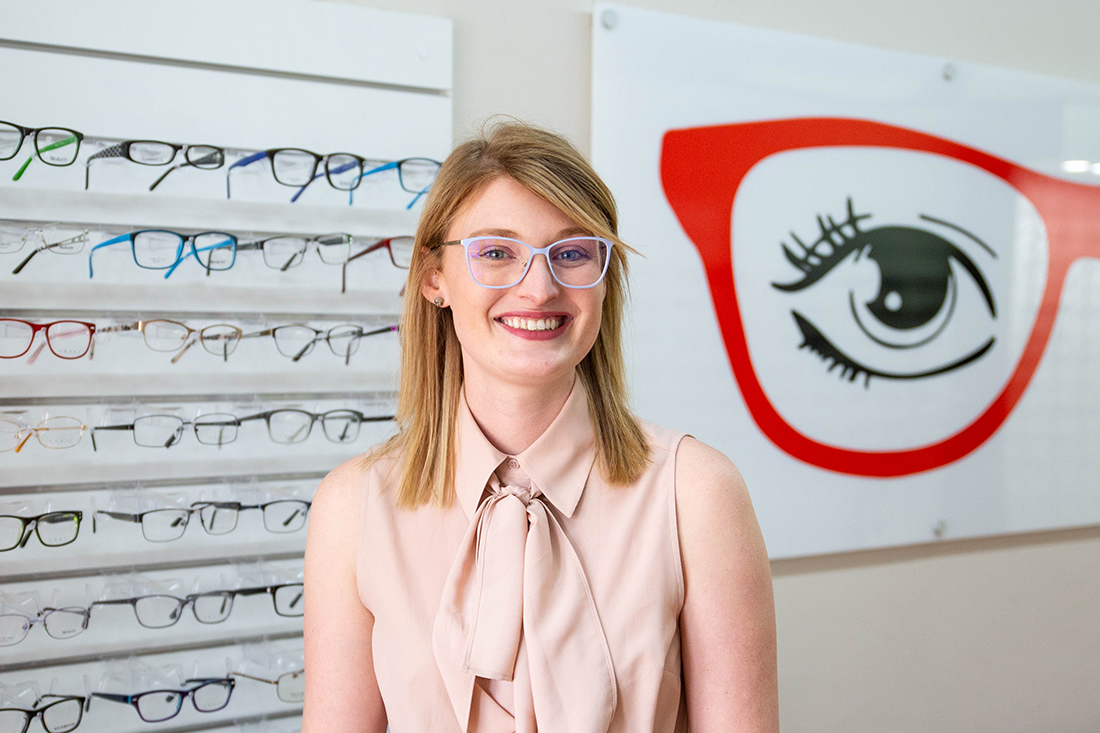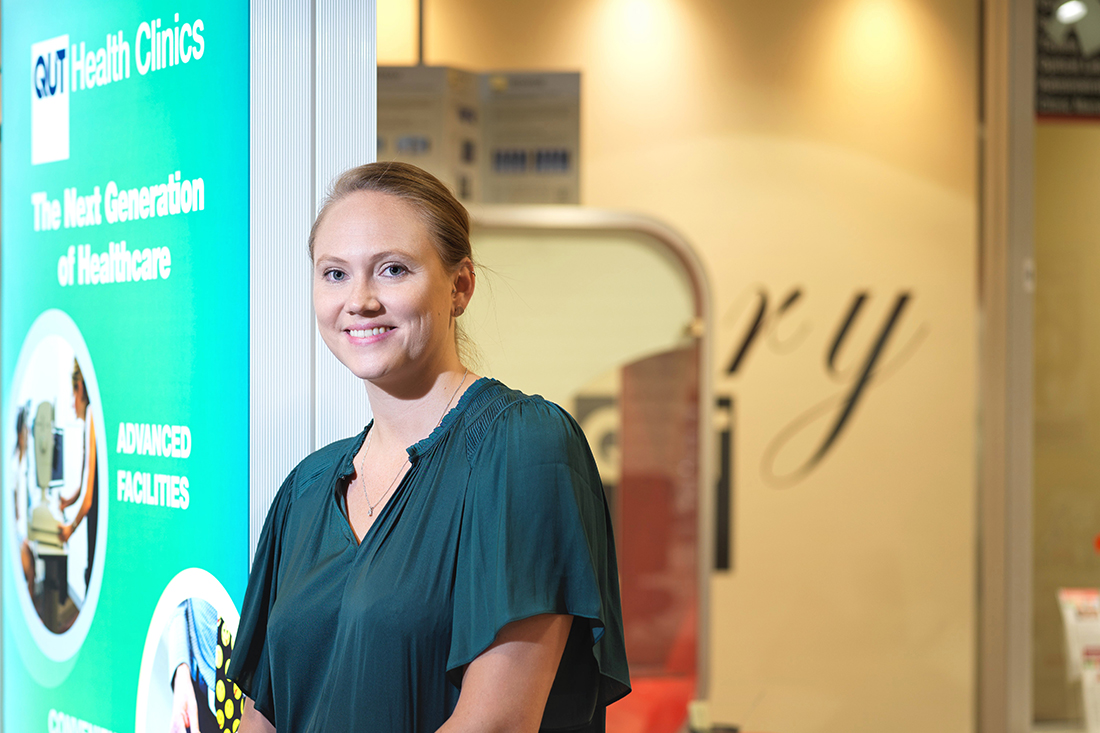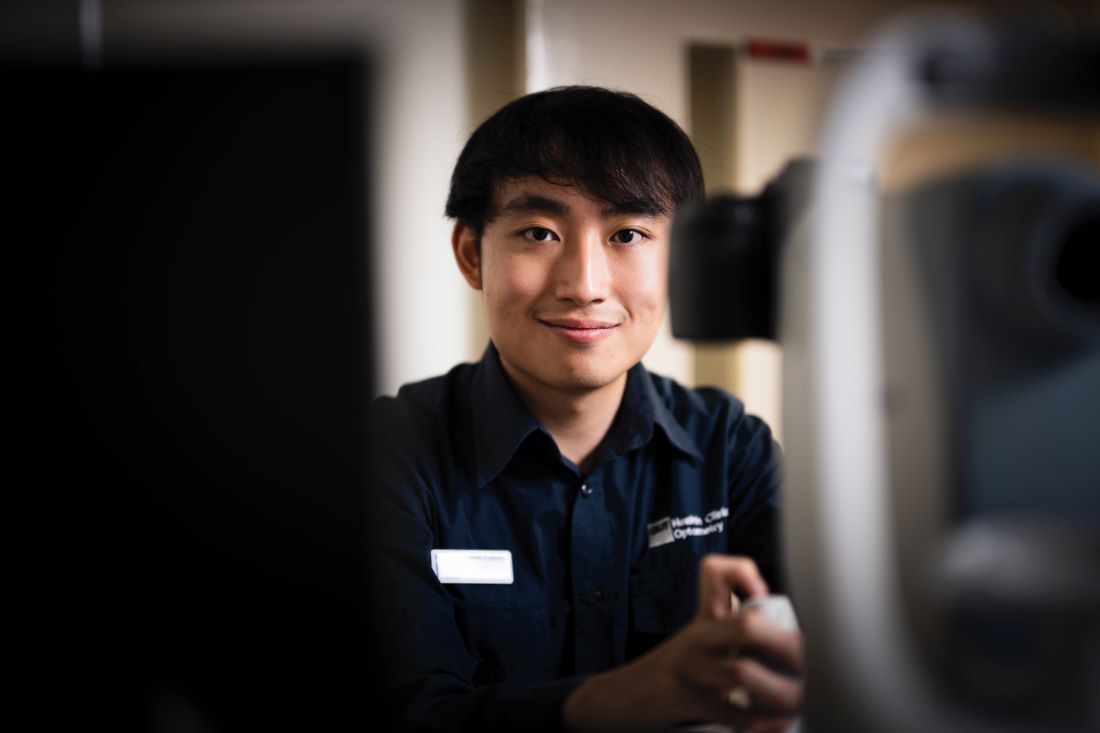Share your success
Growing up in rural NSW, I was always aware of the lack of services available to communities like mine. What ultimately led me to optometry was spending time with my childhood optometrist and watching what he did. At QUT, having lecturers that were also practising clinicians was amazing. They were able to provide real-world case studies and examples which was invaluable. I also loved seeing patients at the QUT Health Clinics, doing external placements, as well as volunteer work at schools, screening days, and events. I’m now an optometrist based in rural NSW, travelling around to practise and giving back to small communities.
Mentoring the next generation
I am a clinical supervisor at the QUT optometry clinic, while also researching vision problems among Aboriginal and Torres Strait Islander children as part of my PhD. I am passionate about mentoring our future optometrists, guiding them towards a rewarding career, and challenging them to improve the standards of primary eye care in Australia. I enjoy training students on the use and interpretation of the optometry clinic’s advanced diagnostic equipment which allows our patients to receive the highest quality care.
Make a difference in the field
'My course gives me insight into different eye diseases and opportunities for problem-solving in vision. It equips us to proactively promote eye care by detecting potential issues early through the identification of red flags. What sets my course at QUT apart is its commitment to staying up to date with the latest developments and practices, ensuring that our learning is directly relevant to the dynamic needs of the industry.'
Bachelor of Vision Science graduate and Master of Optometry student
Share your success
Growing up in rural NSW, I was always aware of the lack of services available to communities like mine. What ultimately led me to optometry was spending time with my childhood optometrist and watching what he did. At QUT, having lecturers that were also practising clinicians was amazing. They were able to provide real-world case studies and examples which was invaluable. I also loved seeing patients at the QUT Health Clinics, doing external placements, as well as volunteer work at schools, screening days, and events. I’m now an optometrist based in rural NSW, travelling around to practise and giving back to small communities.
Mentoring the next generation
I am a clinical supervisor at the QUT optometry clinic, while also researching vision problems among Aboriginal and Torres Strait Islander children as part of my PhD. I am passionate about mentoring our future optometrists, guiding them towards a rewarding career, and challenging them to improve the standards of primary eye care in Australia. I enjoy training students on the use and interpretation of the optometry clinic’s advanced diagnostic equipment which allows our patients to receive the highest quality care.





Highlights
There is no direct entry into this course. This is the second component of a five year dual degree program, comprising a three year Bachelor of Vision Science (OP45), followed by a two year Master of Optometry (OP85).
- Graduate able to practise as an optometrist and register with the Optometry Board of Australia.
- Receive individual attention from experienced lecturers in small classes.
- Develop and practise clinical skills at the QUT Optometry Clinic.
- Prepare for a career in private practice, contact lens practice, paediatric vision, occupational/public health vision or low vision.
Highlights
There is no direct entry into this course. This is the second component of a five year dual degree program, comprising a three year Bachelor of Vision Science (OP45), followed by a two year Master of Optometry (OP85).
- Graduate able to practise as an optometrist and register with the Optometry Board of Australia.
- Receive individual attention from experienced lecturers in small classes.
- Develop and practise clinical skills at the QUT Optometry Clinic.
- Prepare for a career in private practice, contact lens practice, paediatric vision, occupational/public health vision or low vision.
Why choose this course?
A graduate of OP45 Bachelor of Vision Science must also complete the Master of Optometry to be eligible for registration as an optometrist.
The course provides increased exposure to real world learning experiences both within QUT Health Clinics, and in the workplace via the inclusion of extended clinical placements.
Case-based learning and case-based assessment will enhance the training in diseases of the eye and ocular therapeutics. Guest lecturers and practising optometrists are involved in the clinical training.
Explore this course
This course is the second component of a five year dual degree program, comprising a three year Bachelor of Vision Science (OP45), followed by a two year Master of Optometry (OP85).
Note that:
- both degrees need to be completed before a graduate can apply for registration as an optometrist
- there is no direct entry to the OP85 course
- all applicants enter the program through the OP45 Bachelor of Vision Science and progress to the OP85 course on successful completion of the OP45 course
The profession of optometry is undergoing expansion in its scope of practice as a result of legislative amendments to allow appropriately trained optometrists to use therapeutic pharmaceutical agents in the practice of optometry. The five year program increases graduates' depth of knowledge in the areas of general and ocular pharmacology, with training in the therapeutic management of eye disease.
Work Integrated Learning
During this course, you will be required to complete 616 hours of work placement.
Information for existing optometrists
The Master of Optometry course provides the second component of the entry-level program to the profession in Australia - it is not designed to provide qualified optometrists with a masters level qualification. A route for further study is through higher degree research training.
Information for overseas trained optometrists
Overseas trained optometrists seeking to gain registration in Australia should contact the Optometry Council of Australia and New Zealand for details concerning eligibility for registration through the assessment process before considering further study.
Course requirements
There are requirements that you will need to meet as a student in this course. You will need to identify these requirements and ensure you allow sufficient time to meet them.
Some of these requirements have associated costs. Information is available from the Additional course requirements and costs website.
Careers and outcomes
Graduates in optometry have exciting careers that may include clinical practice in a range of optometric settings, or teaching and research positions in Australia and overseas. Many graduates enter private practice with a view to future partnership or the establishment of their own practice. An increasing number of graduates are working alongside other health professionals in medical ophthalmology clinics.
Graduates of the dual award program can work or specialise in areas such as contact lens practice, paediatric vision, occupational/public health vision, or low vision.
Professional recognition
The dual degree program Bachelor of Vision Science/ Master of Optometry meets the requirements for accreditation by the Optometry Council of Australia and New Zealand. Graduates of the program meet the requirements for registration by the Optometry Board of Australia.
Students must complete the Master of Optometry as well as the Bachelor of Vision Science to be eligible for registration.
The Australian Health Practitioner Regulation Agency (AHPRA) requires that graduates demonstrate English language skills at IELTS level 7 with no sub-score less than 7 (or equivalent) before being considered for professional registration. For further information visit the AHPRA website.
Please refer to the Optometry Board of Australia website for additional information on the Board's Registration Standards.
Student registration
QUT automatically registers students enrolled in this course with the Optometry Board of Australia in accordance with the Health Practitioner Regulation National Law Act 2009. Details about student registration are available from the Australian Health Practitioner Regulation Agency.
Possible careers
- Optometrist
- Course code
- OP85
- CRICOS code
- 065379E
-
- Kelvin Grove
-
- Kelvin Grove
- 2 years full-time
- 2 years full-time
- February
- February
Entry requirement
Additional information
Deferment
Minimum academic requirements
Entry requirements
Successful completion of QUT's Bachelor of Vision Science with a minimum grade point average (GPA) score of 4.00 on QUT's 7 point scale completed within two years of commencing the Master of Optometry.
Students who have not completed QUT’s Bachelor of Vision Science
The Master of Optometry course provides the second component of the OP45 Bachelor of Vision Science/OP85 Master of Optometry dual degree entry-level program which leads to registration as an optometrist for practice in the optometry profession in Australia. It is not designed to provide qualified optometrists with a masters level qualification.
If you already have an optometry qualification and are seeking to practice as an optometrist in Australia, you should contact the Optometry Council of Australia and New Zealand (www.ocanz.org) regarding the assessment process for overseas trained optometrists wishing to practice optometry in Australia. If you wish to obtain an Australian optometry qualification then you will need to apply for the OP45 Bachelor of Vision Science/OP85 Master of Optometry dual degree award. Your previous overseas studies in optometry may be considered for advanced standing towards the five-year program.
Your application for OP45/OP85 must include:
- Details of your Optometry/Vision Science undergraduate degree including course overview and unit outlines.
- Details of any assessment regarding your qualifications you may have received from the Optometry Council of Australia and New Zealand.
Minimum English language requirements
Select the country where you completed your studies to see a guide on meeting QUT’s English language requirements.
Your scores and prior qualifications in English-speaking countries are considered. Approved English-speaking countries are Australia, Canada, England, Ireland, New Zealand, Scotland, United States of America and Wales.
If your country or qualification is not listed, you can still apply for this course and we will assess your eligibility.
We accept English language proficiency scores from the following tests undertaken in a secure test centre. Tests must be taken no more than 2 years prior to the QUT course commencement.
| English Test | Overall | Listening | Reading | Writing | Speaking |
|---|---|---|---|---|---|
| IELTS Academic / One Skill Retake | 7 | 6.5 | 6.5 | 6.5 | 6.5 |
|
Cambridge English Score
You must share your results with QUT through the Candidate Results Online website. |
185 | 176 | 176 | 176 | 176 |
| PTE Academic | 65 | 58 | 58 | 58 | 58 |
| TOEFL iBT | 98 | 20 | 20 | 24 | 20 |
Don't have the English language score you need? We can help!
We offer English language programs to improve your English and help you gain entry to this course.
When you apply for this course, we will recommend which English course you should enrol in.
Your actual fees may vary depending on which units you choose. We review fees annually, and they may be subject to increases.
2026 fees
2026: Fee available from October
Additional Costs
There are requirements that you will need to meet as a student in this course. Some of these requirements have associated costs. Information is available from the Additional course requirements and costs website.
2026 fees
2026: Fee available from July
Additional Costs
There are requirements that you will need to meet as a student in this course. Some of these requirements have associated costs. Information is available from the Additional course requirements and costs website.
2025 fees
2025: CSP $9,400 per year full-time (96 credit points)
Additional Costs
There are requirements that you will need to meet as a student in this course. Some of these requirements have associated costs. Information is available from the Additional course requirements and costs website.
2025 fees
2025: $37,000 per year full-time (96 credit points)
Additional Costs
There are requirements that you will need to meet as a student in this course. Some of these requirements have associated costs. Information is available from the Additional course requirements and costs website.
Student services and amenities fees
You may need to pay student services and amenities (SA) fees as part of your course costs.
FEE-HELP: loans to help you pay for your course fees
You may not have to pay anything upfront if you're eligible for a FEE-HELP loan.
You can apply for scholarships to help you with study and living costs.
Equity scholarships scheme
A scholarship for low-income students studying in any faculty.
- Scholarship eligibility
- Struggling financially
Keep up to date
QUT courses for you
Like to save your courses?
Please enter your first name and email so we can save your courses for you